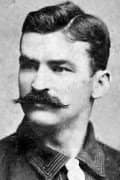5/25/1899 – St. Louis hosted Brooklyn with a batting order that was different than the usual one employed by the team. Cupid Childs hit fourth, making an out to end the first inning. It was Lou Criger’s spot, but nothing was said about the mistake. Bobby Wallace, the proper next batter, started the second with a hit and then it should have been Patsy Tebeau’s turn at the plate. However, Criger hit and singled. Criger was called out for hitting out of turn and Tebeau sent to the plate. Brooklyn beat St. Louis, 8-1, as the home team made five errors.
5/25/1899 – St. Louis hosted Brooklyn with a batting order that was different than the usual one employed by the team. Cupid Childs hit fourth, making an out to end the first inning. It was Lou Criger’s spot, but nothing was said about the mistake. Bobby Wallace, the proper next batter, started the second with a hit and then it should have been Patsy Tebeau’s turn at the plate. However, Criger hit and singled. Criger was called out for hitting out of turn and Tebeau sent to the plate. Brooklyn beat St. Louis, 8-1, as the home team made five errors.


